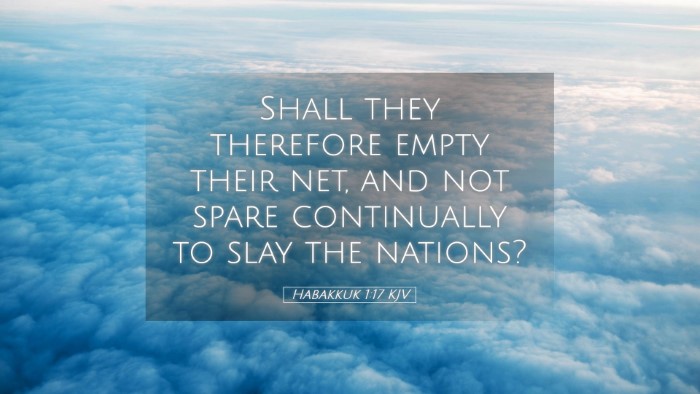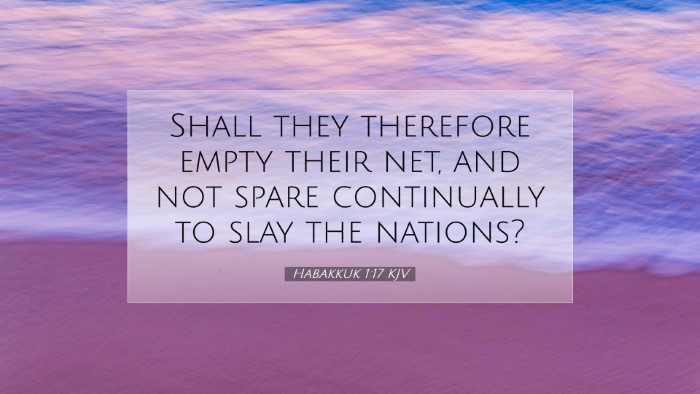Old Testament
Genesis Exodus Leviticus Numbers Deuteronomy Joshua Judges Ruth 1 Samuel 2 Samuel 1 Kings 2 Kings 1 Chronicles 2 Chronicles Ezra Nehemiah Esther Job Psalms Proverbs Ecclesiastes Song of Solomon Isaiah Jeremiah Lamentations Ezekiel Daniel Hosea Joel Amos Obadiah Jonah Micah Nahum Habakkuk Zephaniah Haggai Zechariah MalachiHabakkuk 1:17
Habakkuk 1:17 KJV
Shall they therefore empty their net, and not spare continually to slay the nations?
Habakkuk 1:17 Bible Commentary
Commentary on Habakkuk 1:17
Verse Context: Habakkuk 1:17 states, "Shall they therefore empty their net, and not spare continually to slay the nations?" This verse reflects an inquiry into the oppressive nature of the Chaldeans, who are depicted as merciless conquerors using their prowess to subdue nations.
Overview of Habakkuk's Lament
Habakkuk wrestles with profound theological questions regarding God’s justice. The prophet struggles to understand how a holy God can allow evil, particularly the violent acts committed by the Chaldeans. This verse serves as a crucial turning point, indicating both the brutality of their conquests and Habakkuk’s outcry against the suffering inflicted upon the nations.
Insights from Matthew Henry
Matthew Henry stresses the sorrowful lamentation of Habakkuk, pointing out that the Chaldeans not only kill but also relentlessly seek to dominate. He reflects on the metaphor of the net, symbolizing how nations are caught and destroyed in their pursuit for control. Henry emphasizes God’s ultimate justice, noting that while the wicked may seem to prosper, they are ultimately accountable to God.
- The imagery of the net: Henry notes that the net signifies a trap, underlining the cunning and calculated strategies of the Chaldeans.
- The relentless pursuit: The phrase "not spare continually" captures the essence of their brutality, indicating an unending cycle of violence.
- Divine justice: Despite the current oppression, Henry reassures readers that God has a plan, suggesting that eventual judgment awaits the merciless.
Insights from Albert Barnes
Albert Barnes views this verse as indicative of the desolation brought by the Chaldeans. He interprets the "net" as a tool of conquest, representing their methodical approach to warfare. Barnes explains that the ruthless nature of their conquests questions whether God will permit such devastation to occur without intervening.
- Human suffering: Barnes highlights the emotional and spiritual turmoil faced by nations devastated by warfare. This commentary underscores the anguish that follows violence.
- God’s silence: He notes the silence of God amidst chaos, urging believers to ponder the implications of divine inaction in the face of human brutality.
- Call for justice: Barnes presents this lament as a precursor to hope, suggesting that it ultimately drives the faithful to seek justice from God.
Insights from Adam Clarke
Adam Clarke provides a nuanced analysis, noting the sociopolitical implications of the verse. He discusses the historical context of the Babylonians' invasive and oppressive behavior, labeling their actions as tyrannical. Clarke reflects on the prophetic voice of Habakkuk as representative of those who suffer under injustice.
- Metaphor’s significance: Clarke elaborates on the metaphor of emptying the net as a symbol of complete annihilation; not only do they capture the nations, but they also leave them desolated and barren.
- Prophetic warning: He interprets this lament as both a warning and a call for repentance, emphasizing the need for restoration and accountability, even within powerful nations.
- Future hope: Clarke concludes that despite this grim portrayal of war, there is an implicit hope for restoration and reconciliation embedded within the prophetic narrative.
Theological Implications
This passage invites theological reflection on the nature of evil in the world and the problem of suffering. It raises questions about the characteristics of God’s justice, mercy, and the apparent silence that sometimes accompanies human turmoil. The verse serves as an impetus for pastors, scholars, and students to delve deeper into the relationship between divine sovereignty and human agency.
- God’s Sovereignty: Examining God’s control over nations and history in contrast to the actions of human agents.
- The nature of evil: An analysis of how evil is allowed to flourish and the eventual implications for the perpetrators.
- Hope and restoration: Emphasizing the need for a hopeful perspective in the midst of suffering and a reminder of God’s ultimate plan for restoration.
Conclusion
In conclusion, Habakkuk 1:17 encapsulates the struggle between faith and the visible reality of evil. The insights from Henry, Barnes, and Clarke converge to provide a rich understanding of the text, encouraging reflection and deeper investigation into the nature of God, justice, and hope amidst chaos. This passage remains relevant for contemporary readers grappling with similar questions of injustice, urging them to trust in God's ultimate plan and timing.


